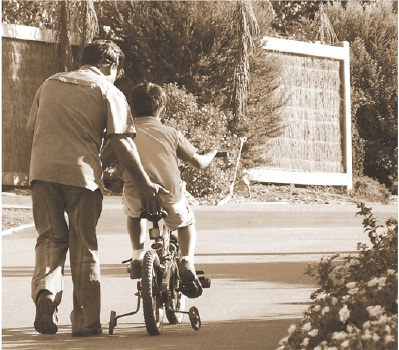My father was not a particularly educated man and he died too young-just as we were learning to be friends as it happens-but he taught me many things for which I remain grateful today. How to ride a bicycle for example; holding onto the saddle and running behind me, promising he wouldn’t let go and then one day quietly doing just that. And how to lay down floor tiles in an aesthetically pleasing way; particularly important if the tiles are patterned. (You start from the middle of I he room; two pieces of string stretched diagonally corner-to-corner to mark the starling point). As an impoverished drama student in London in the late ’60s this was a skill for which I was most grateful.
His most endearing-and enduring-lesson
was that the way to find true happiness
was to be in service to other people.
Laying linoleum tiles in people’s kitchens beat waiting on tables, though I did also work as a bartender at the Cockney Pride pub in Piccadilly Circus where the Irish waitresses whispered to me cocktail recipes I’d falsely claimed at the job interview I knew by heart. We didn’t do cocktails at our house. My father would not have known a Tom Collins from a Knickerbocker Glory; the odd half-pint of Barnsley Bitter his most exotic indulgence.
His most endearing-and enduring-lesson was that the way to find true happiness was to be in service to other people. He knew this for a fact. It is how he lived his life. Working with those less able than he was to fit into the community we grew up in, he found satisfaction in making a difference in other peoples lives. I don’t remember now if he put it in those exact words-probably not; he wasn’t one for saying all that much at all-but the message stayed with me (as it has with my brother and sister, too). And, yes, we are happy.
It isn’t hard to make a difference in the life of someone you’ve never met. In Tokyo most Ward Offices will gladly accept clothing, blankets, and other items that will benefit the homeless (provided they are clean and not completely worn out). Many have specific days of the month when they open collection centers: check with them. Cleaning out your closet can make a big difference to someone who doesn’t even have a space the size of your closet to live in and therefore can be doubly therapeutic. You can help feed the homeless-sadly growing in number here in Japan-through a variety of programs such as that run by the Franciscan Chapel Center. You can volunteer to support TELL, a free, anonymous counseling service thai is most likely to be in greater demand than ever in these trying limes. You don’t need to be a counselor to help; TELL needs volunteers for all kinds of tasks. And you can just look out for those around you. One of the greatest gifts you can give (to yourself, loo, as it happens) is to do something for someone you think is in need of help without telling them it’s you who’ve done it.
Ian do Stains, OBE is the Executive Director of the British Chamber of Commerce in Japan. He is also a Fellow of the Chartered Insl it ille of Arbitrators and Convenor of its Japan Chapter.









